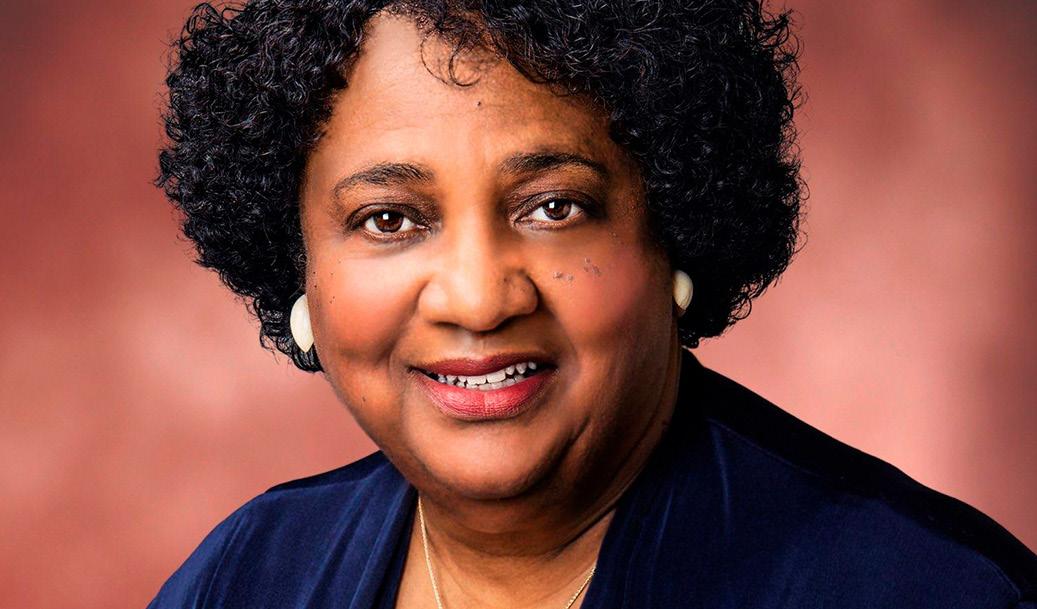
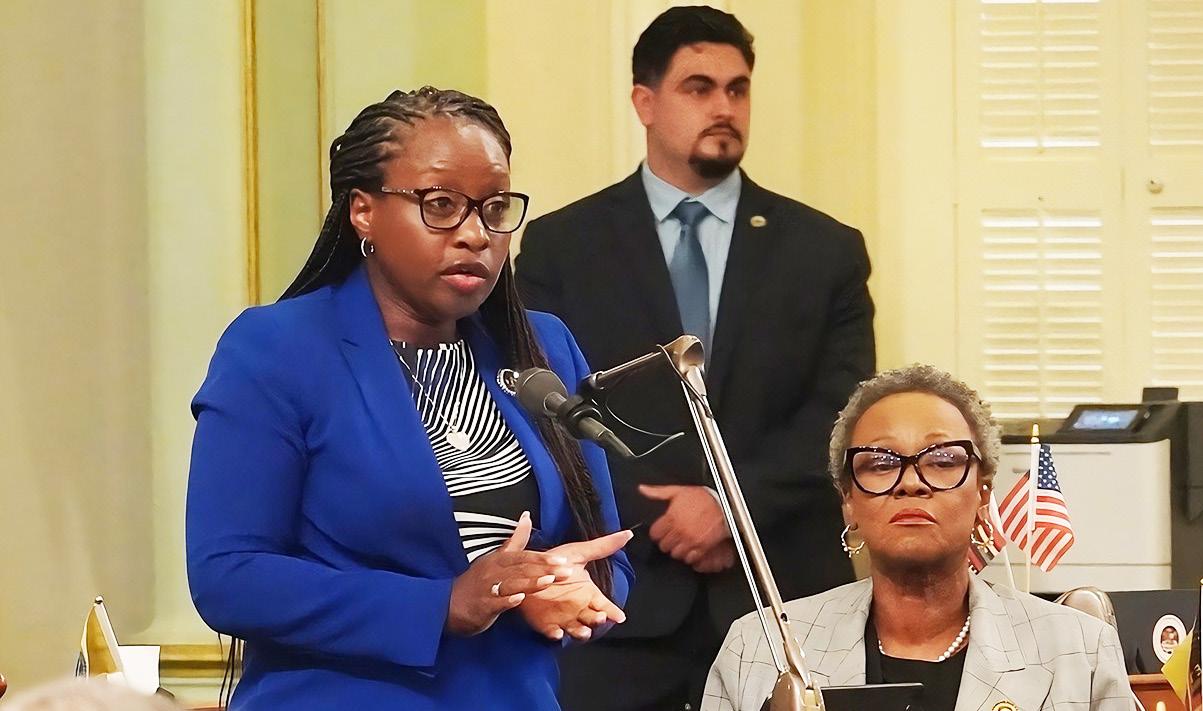
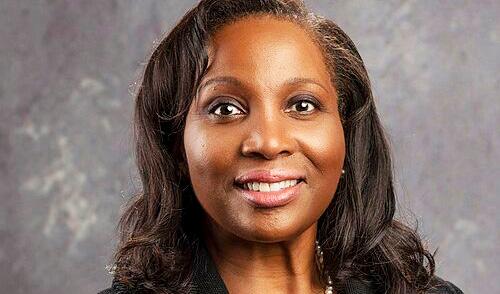







“Where there is no vision, the people perish...” Proverbs 29:18 postnewsgroup.com
Mayor Barbara Lee Reports on Her First 100 Days’ Achievements
‘We are delivering with measurable progress that residents can see and
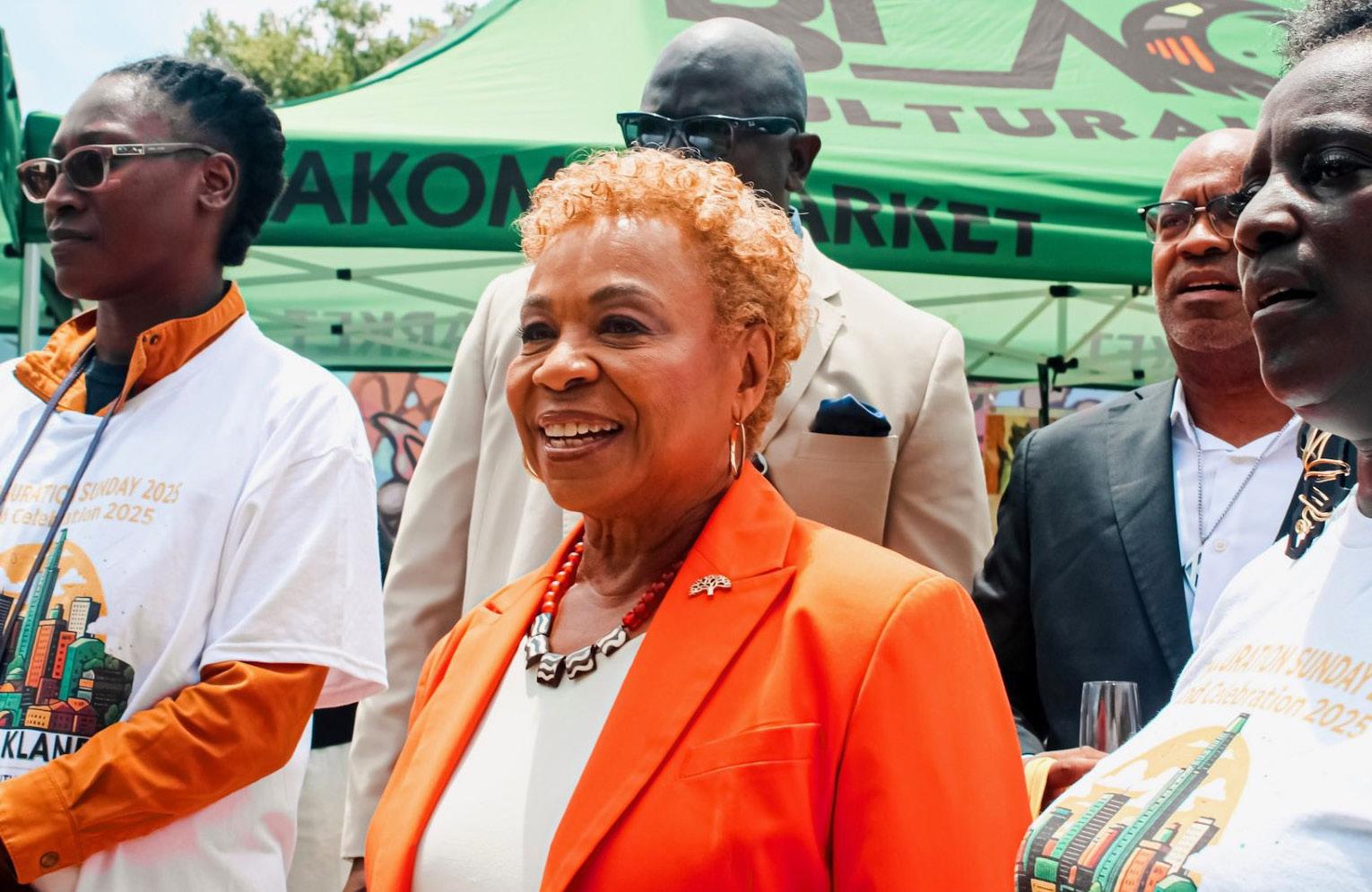
Aug. 24, she said.
Mayor Barbara Lee this week issued a report to Oakland residents on the progress she already has made during her first 100 days in office to enhance public safety, economic development, homelessness solutions, and community revitalization.
The mayor has delivered on key campaign promises with “measurable results,” including a 30% reduction in crime citywide as of

“We promised Oaklanders a comprehensive approach to our city’s challenges, and even though there is still work to be done, we are delivering with measurable progress that residents can see and feel in their daily lives,” she said.
Lee’s public safety initiatives include increasing nighttime and weekend Police and Community Safety Ambassador presence downtown, training community
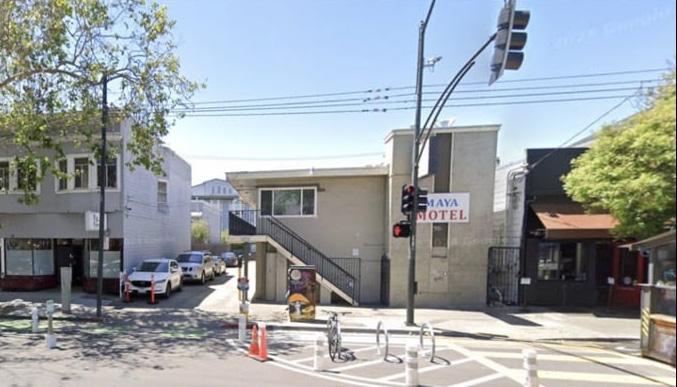
The City of Oakland this week announced it has received a $7.1 million grant from State of California in State Homekey+ funds to transform the Maya Motel at 4715 Telegraph Ave. in Oakland into 23 fully equipped apartments for people transitioning out of homelessness.
The funding is available through voter-approved Proposition 1, which provides $6.4 billion
By Zack Haber
For the next year, many
for mental health treatment and housing with services.
“The Maya project demonstrates what Oakland can accomplish when we combine smart policy with decisive action,” said Oakland Mayor Barbara Lee.
“Every one of these 23 units represents a person who will have stability, dignity, and the support they need to rebuild,” she said.
“Oakland leads by example, and we’re committed to moving for-
Resident Calls Out Neglect of the ‘Remember Them Monument’ in Downtown Oakland
By Carla Thomas
Just around the corner from the historic Fox Theater in the heart of downtown Oakland stands one of the most remarkable tributes to human dignity and perseverance in the United States. The “Remember Them: Champions for Humanity Monument,” honoring 25 global humanitarians.
Created by world-renowned Oakland sculptor Mario Chiodo, the design is a testament to the resilience and courage of leaders who shaped the course of history. Locat-
ed in the Henry J. Kaiser Memorial Park at the corner of 19th and Rashida Muhammad streets, the sculpture is not only a work of art but also a profound statement of collective memory.
Towering 25 feet high and stretching 52 feet wide, the bronze monument of four sections spans 1,000 square feet and weighs over 60,000 pounds. It is the largest bronze monument on the West Coast and the only monument in the nation exclusively dedicated to
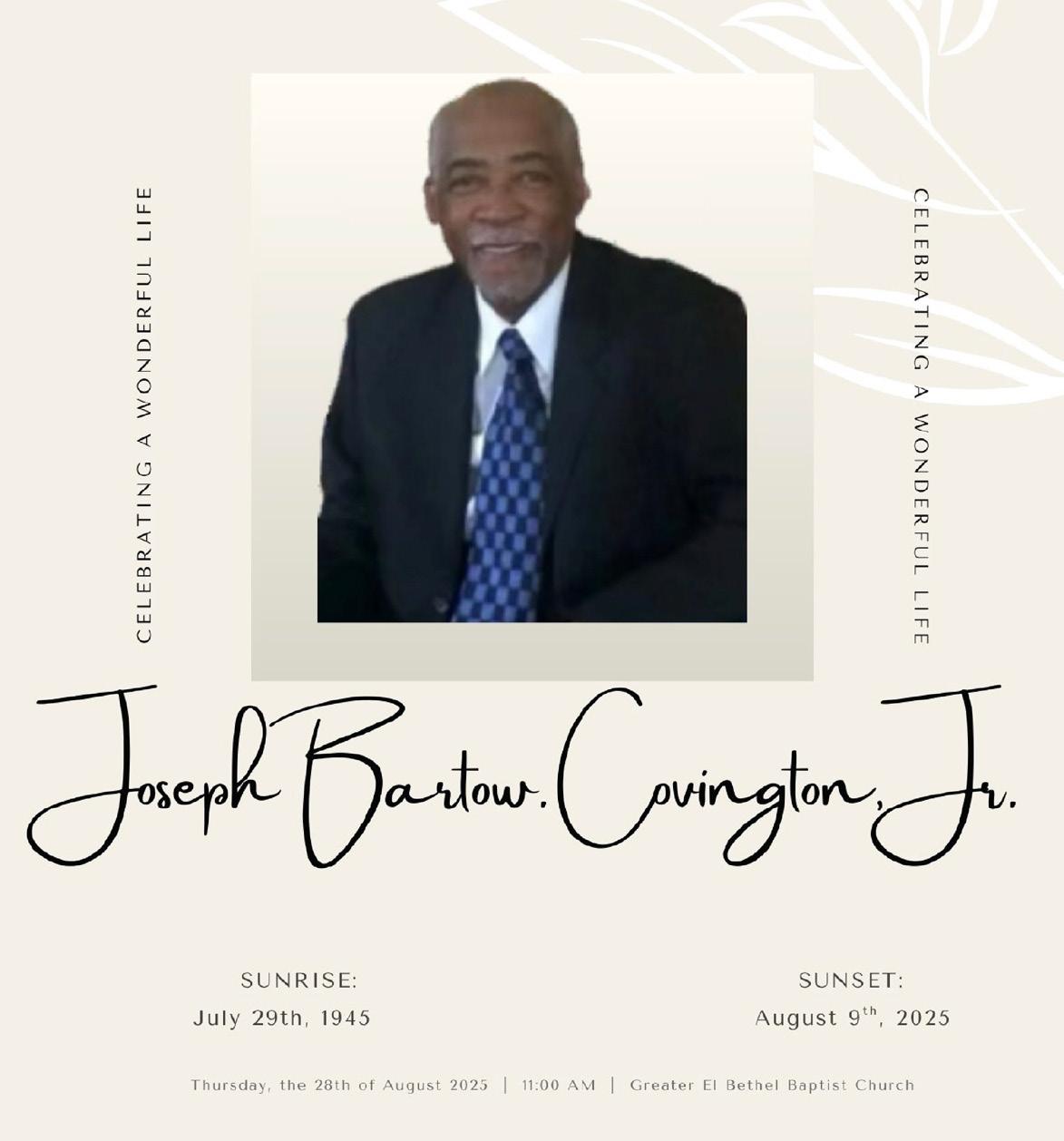
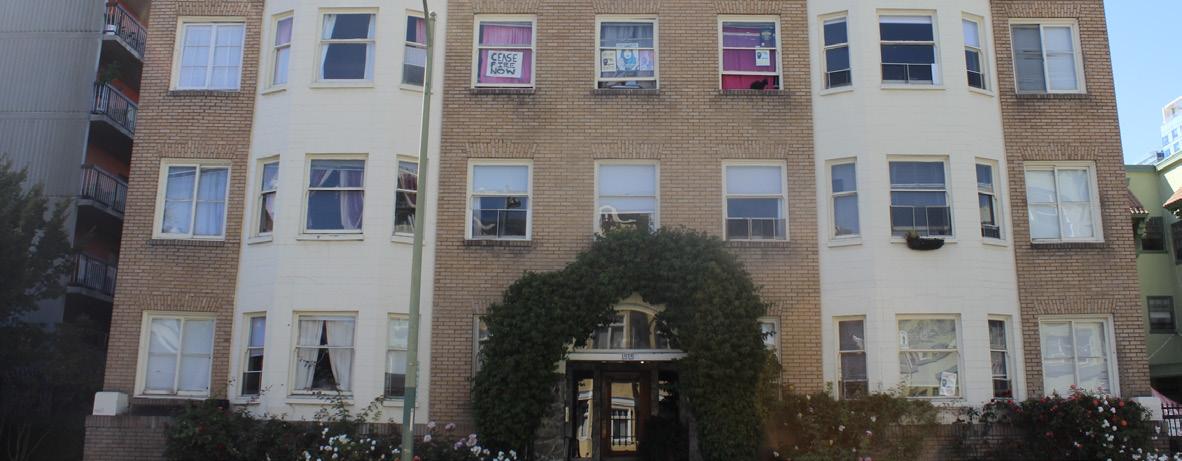
CPI.
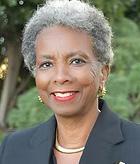
By All People of Color Developmental Disability Association, Inc.
The California Department of Developmental Services (DDS) oversees 21 regional centers across the state, contracting with each center to provide services to children and adults with intellectual and developmental disabilities.
The Regional Center East Bay (RCEB), which serves Alameda and Contra Costa counties is facing mounting scrutiny for their long-standing practices regarding disparate treatment of its African American service providers and consumers.
African American providers house the intellectually and developmentally disabled persons in homes licensed by the State of California. The state has confirmed that there is also disparate treatment of the adult and minor clients who are not granted equal access to services - RCEB funds.
Despite the RCEB’s repeated commitments to reform their service delivery, community testimony and internal reports reveal their continued patterns of unfair practices and unfulfilled promises. This has caused a deepening mistrust of RCEB’s staff and management among service providers, client families and the general public.
Similar complaints have come from Latino and Asian consumers and their communities: Families report RCEB prepares incomplete and inaccurate consumer profiles. Consequently the families do not receive a timely placement or appropriate services. There are also delays in interpretation and translation of key documents that impact the timing of
the placement.
Such delays have led to underutilization of Latino and Asian-operated homes even though the providers also have available capacity and the cultural competency.
The disparities in RCEB’s treatment of Black and Brown providers and consumers have been raised at RCEB Board Provider/Vendor Advisory Committee (PVAC) meetings, board sessions, and community forums from 2008 to 2025.
In 2023, after years of informal complaints, RCEB commissioned Mason Tillman Associates to conduct a racial equity study. The comprehensive report, delivered in January 2025, confirmed the systematic disparities of empty beds in African American homes, incomplete consumer profiles, payment inequities, and disproportionate corrective action reports (CAPs) targeting minority providers.
In March 2025, the newly appointed executive director publicly acknowledged the validity of many provider concerns, stating: “We recognize that these issues are real and must be addressed transparently.”
However, providers noted that this promise was only the latest in a series of assurances with no followthrough dating back to the late ’90s.
The promises to improve transparency in the CAP issuance, commitments to publish referral and payment equity data, and the pledge to present and deliver the Mason Tillman Associates report all remain unfulfilled, fueling frustration among families, providers and the general public.
Testimonies of African American and Latino providers at meetings of the RCEB Executive Board of Directors illustrate the communities’ longstanding concerns with the services RCEB delivers.
An African-American home operator said, “We have beds sitting empty while families are desperate for placement. It feels like we’re being sidelined for reasons that have nothing to do with quality of care.”
Another minority provider’s testimony pointed to additional complaints, “CAPs land on us disproportionately. It’s like we’re being targeted for paperwork instead of
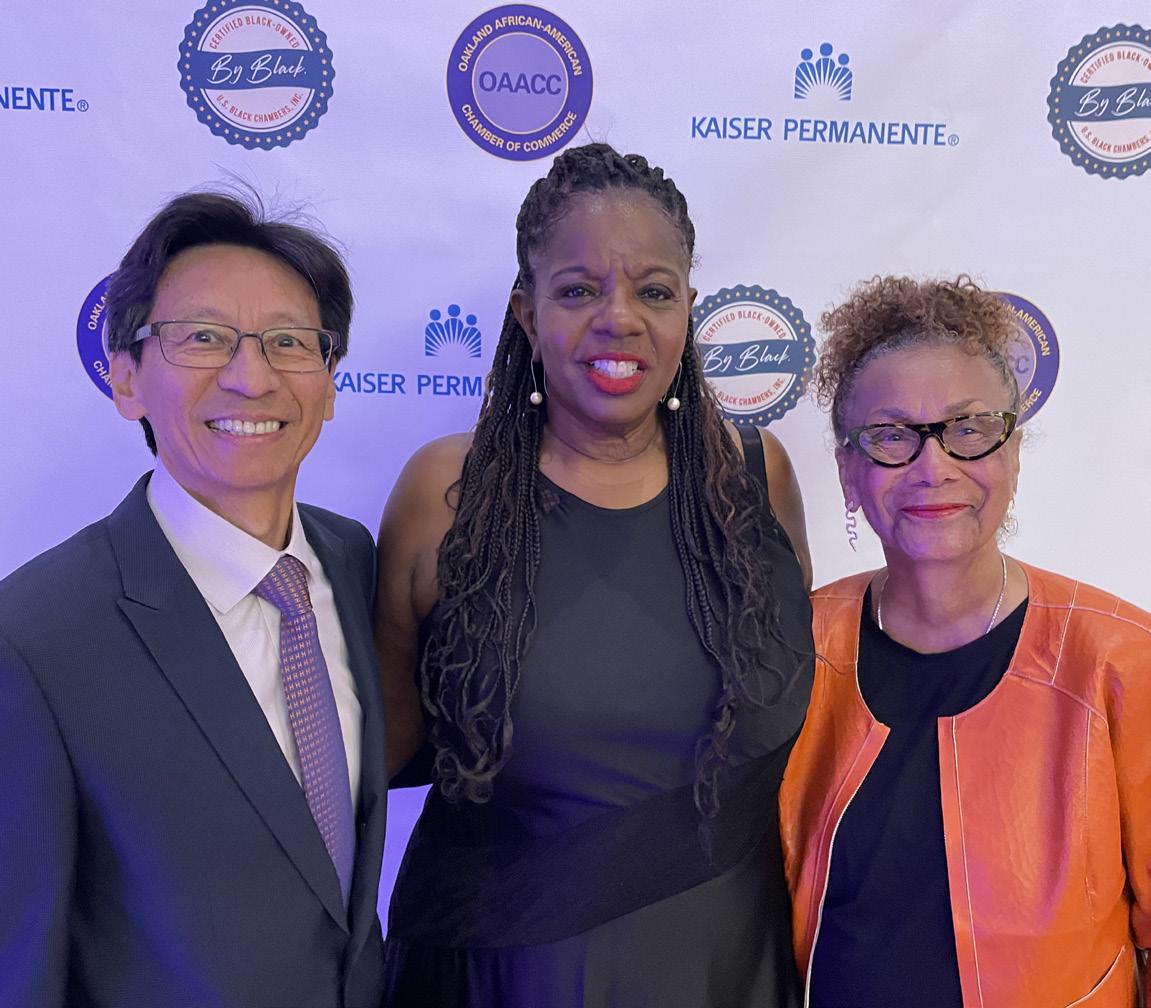
to some single-family homes and condominiums, these
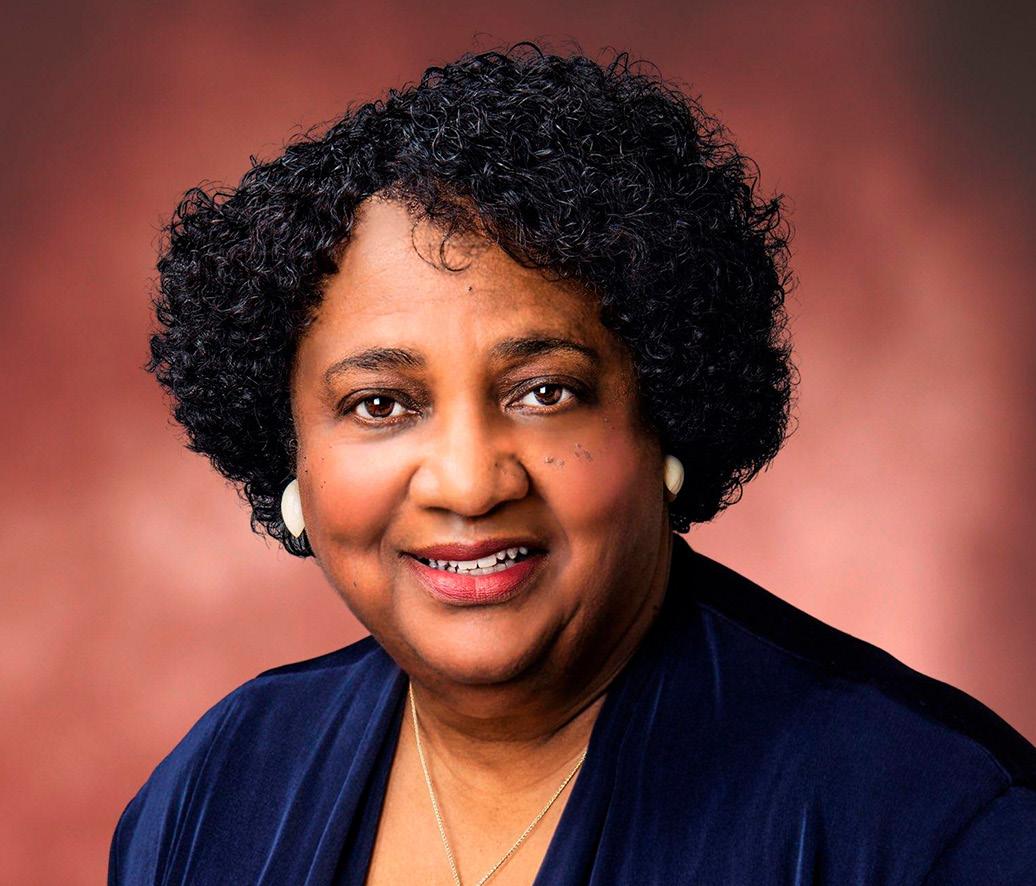
‘California

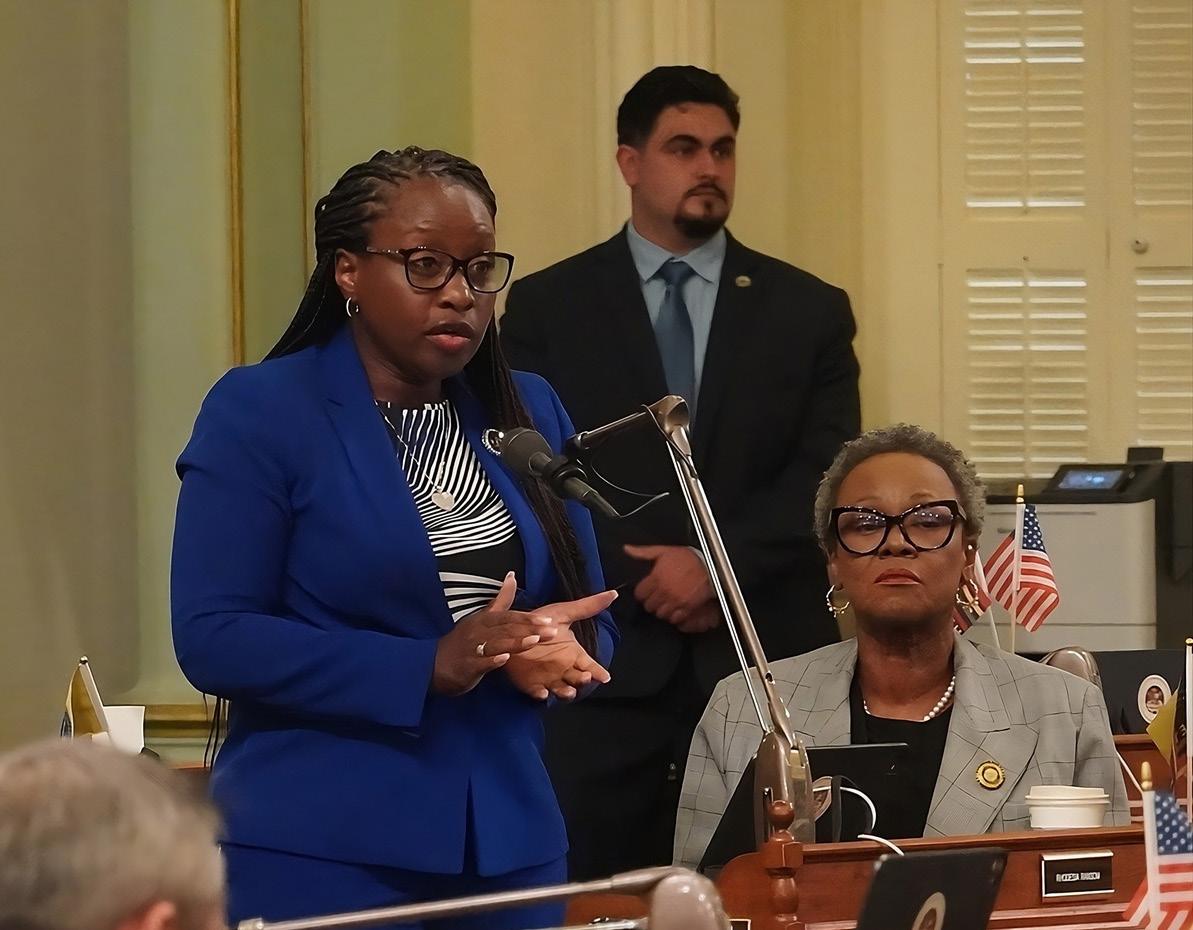
By Bo Tefu, California Black Media
California Secretary of State
Shirley N. Weber is spearheading the implementation process to put Proposition 50 before voters in the Nov. 4 statewide special election.
Weber announced Aug. 21 that she has formally assigned the measure to the ballot and is inviting Californians to submit arguments for or against it.
The proposal, Assembly Constitutional Amendment (ACA) 8, would temporarily adopt the congressional map outlined in Assembly Bill (AB) 604 until 2031, overriding the Citizens Redistricting Commission’s usual authority. Lawmakers say the change responds to mid-decade redistricting in Texas earlier this year and is aimed at protecting California’s representation in Congress.
Weber’s office is accepting ballot arguments until 5 p.m. on Aug. 25. Rebuttals from selected authors are due by 5 p.m. on Aug. 27. Arguments may be delivered
in person at the Secretary of State’s Elections Division in Sacramento, faxed to (916) 653-3214, or emailed to VIGarguments@sos.ca.gov.
Original documents must follow within 72 hours of electronic or faxed submission.
State law gives priority to arguments written by legislators, followed by recognized citizen associations and then individual voters. Ballot arguments cannot exceed 500 words, with rebuttals capped at 250 words. No more than three signers are allowed on each submission.
Weber said the Official Voter Information Guide, which will feature selected arguments and be mailed to every California voting household, ensures voters have “direct access to both sides of every measure so they can make informed decisions.”
If approved by voters, Proposition 50 would temporarily replace the state’s congressional boundaries until the next redistricting cycle in 2031, giving Californians a direct say on how their districts are drawn.
By Antonio Ray Harvey California Black Media
The National Association for the Advancement of Colored People, California-Hawaii State Conference (CA/HI NAACP), is urging the Legislature to pass two reparations bills authored by state Sen. Akilah Weber Pierson (D-San Diego), chair of the California Legislative Black Caucus (CLBC).
The bills — Senate Bill (SB) 518 and SB) 437 — were assigned to the “Suspense File” after review in the Assembly Appropriations Committee.
In the California Legislature, any bill that would potentially cost the state more than $50,000 from the General Fund or $150,000 from special funds is automatically sent to the Suspense File for further consideration at a special hearing.
Rick L. Callender, President of the NAACP Cal-Hi State Conference, said the bills are critical for advancing racial and social justice in California and are a “moral and constitutional imperative.”
“For generations, Black Californians have carried the weight of systemic harm with no redress. These bills offer the state a chance to begin making that right,”
EBALDC AFFORDABLE HOUSING
WAITING LIST OPENING – MULTIPLE PROPERTIES NOW ACCEPTING PRE-APPLICATIONS -Open to the General Public
Opening Date: September 5, 2025 at 9:00 AM Closing Date: September 19, 2025 at 5:00 PM
SRO, Studio, 1-, 2-, 3-, and 4-Bedroom Units Available HOW TO APPLY:
Visit www.ebaldc.org and navigate to “How to Apply” Pre-applications for the lottery must be submitted through the EBALDC Housing Portal Applicants unable to access the online portal may request a paper pre-application Paper Pre-Applications
Available to print online or pick up in person at the location you are interested in Pick-Up Times for Paper Applications:
Paper applications will be received during established business hours for the duration of the waiting list opening
Mail Completed Paper Applications to the Location you are interest in. Paper application must be received by the deadline.
SUBSIDIZED HOUSING OPPORTUNITIES
Project Based Voucher (PBV) Units- PBV units are subsidized through the Oakland Housing Authority (OHA). Rent is based on 30% of adjusted household income as determined by OHA.
Local Housing Assistance Program (LHAP) Units-LHAP units also offer deeply affordable rents and are supported by Oakland Housing Authority
Units Available for Special Program Referrals
We also offer units reserved for applicants who qualify under the following programs:
• MHSA – Mental Health Services Act
• HOPWA – Housing Opportunities for Persons With AIDS
• VASH – Veterans Affairs Supportive Housing
Homeless – Individuals and families experiencing homelessness Applicants must be referred by their program case manager or participating agency. Please check eligibility with your service provider.
Eligibility Requirements:
• Household must meet occupancy standards
• Annual household income must be at or below income limits set by various regulatory agencies
• Disabled persons are encouraged to apply;
• All requests for reasonable accommodation will be considered
For more information, visit www.ebaldc.org and navigate to “How to Apply” or call our Housing Info Line: (510) 626-0683
Languages available: Spanish, Chinese
Participating Communities: Drasnin Apt • Effie’s House • Hismen HinNu Terrace • Madison Park • Madrone Hotel • Marcus Garvey Commons• Oak Park Apartments• Oakland Point LP • Hugh Taylor House • Frank G. Mar • Phoenix• San Pablo Hotel • Slim Jenkins Court • Seven Directions Apts. East Bay Asian Local Development Corporation (CA Bro. Lic. #00990167) Felicia Scruggs, Broker-Officer (CA Bro. Lic.
Callender said.
“The NAACP has long demanded reparations for the descendants of slavery,” Callender continued. “California must lead with courage, not caution, and move these bills forward.”
SB 518 proposes the establishment of an agency to implement state-level reparations for eligible descendants of enslaved individuals. SB 437 authorizes California State University (CSU) to use genealogical records to determine eligibility for initiatives benefiting descendants of enslaved persons.
“We call on the committee to advance both measures so that California can continue to lead on justice, accountability, and equal opportunity,” the NAACP Cal-Hi State Conference stated in a Aug. 20 letter.
Both bills are part of the CLBC’s “Road to Repair 2025 Priority Bill Package and are based on recommendations made by the California Reparations Task Force.
In July, both bills passed out of the Assembly Judiciary Committee, where they were re-referred to the Assembly Appropriations Committee. The
By Antonio Ray Harvey California Black Media
California Legislative Democrats — with the support of the California Legislative Black Caucus (CLBC) — are gearing up to add five additional Democratic U.S. House of Representatives.
That move, those leaders say, counters partisan redistricting efforts in Texas.
Last week, the state Legislature passed ACA 8 which will appear on the ballot as Proposition (Prop) 50 — the “Election Rigging Response Act” — in a special election set for Nov. 4. The bill gives Californians the chance to adopt a temporary Congressional map favorable to Democrats.
CLBC chair Sen. Akilah Weber Pierson (D-San Diego) stated that “California’s response is not one I take lightly” and the redistricting measures are about “defending our right to fair representation.”
“Californians have for far
too long felt the consequences of decisions made far from our state, and we are now bearing the brunt of the Trump administration’s policies,” Weber Pierson stated.
“Tariffs are driving up consumer prices, changes in healthcare policy are increasing costs and narrowing access, federal support for vital infrastructure is becoming increasingly unreliable, and cuts to our educational systems are limiting opportunities for some of our most vulnerable communities,” Weber Pierson continued.
According to the CLBC, Black communities in California and across the country have been disproportionately harmed by the policies and funding reversals of the Trump administration.
Assemblymember Rhodesia Ransom (D-Stockton), also a member of the CLBC, said during the floor debate on Aug. 21 that it was necessary to pass bills to place


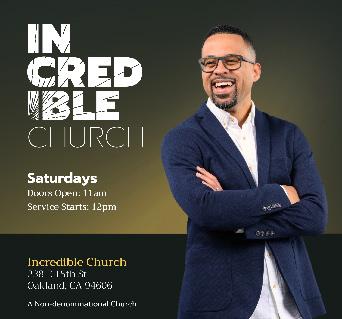
Dedicated staff needed to work with individuals with developmental disabilities in communitybased settings, or environments.
Qualifications: High school or equivalent. Driver’s license. Dependable and efficient. Background check. Physical exam and TB test. Training available. Decent wages. Please call (510) 690-9570.
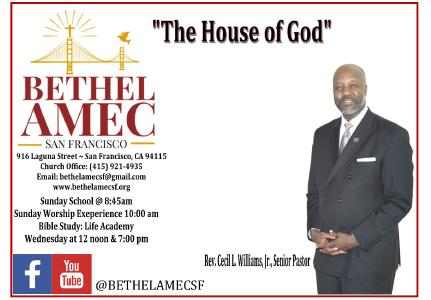
By Tamara Shiloh

By Terri Schlichenmeyer
The Bookworm Sez
One thousand two hundred pounds and four legs.
Put that between your knees and you’ll find out what real horsepower is. You’re five feet off the ground, moving as fast as a car on a downtown street, hooves pounding as hard as your heart. Dangerous? Maybe. But as you’ll see in “Mounted” by Bitter Kalli, your ancestors did it and so can you.
When they were a young child, “around the age of 6 or 7,” someone gave Bitter Kalli a set of “pony books,” the kind that appeal to young girls, mostly white ones. Kalli wasn’t entirely comfortable identifying as a girl then, but they adored the books, in part because the stories featured the kinds of friendships and acceptance Kalli wanted. After devouring those
stories, they begged their parents for riding lessons from a nearby Brooklyn stable.
Fast forward to 2014, when Kalli was 17 years old, an experienced equestrian, a trans individual, and a protester at college. During that protest, they watched the horses that carried the police and wondered what those animals saw in the crowd.
For that matter, what did horses see throughout Black history?
In times of slavery, it was not uncommon for fleeing slaves to steal a horse or two to get away faster. Kalli shares heart-pounding tales of escape, providing examples of how human chattel was often compared to equines in newspaper ads, as slaveholders mourned the loss of the latter much deeper than the former.
Many Americans are unaware of
erts is excerpted from the MacArthur Fellows web site.
Body: Race, Reproduction, and the Meaning of Liberty 1997)”, she
state intervention and the results of those interventions.
of norms.
the rich contributions that African Americans made to the settling of the West. Kalli examines a popular movie, deconstructing it and adding real history to the Hollywood tale.
A graduate of Yale University with a law degree from Harvard, Dorothy Roberts is a legal scholar and public policy researcher exposing racial inequities embedded within health and social service systems.
“What we know as the Wild West would not exist without the 182,000 enslaved people living in Texas in 186o,” they say.
Sine 2012, she has been a professor of Law and Sociology, and on the faculty in the department of Africana Studies at the University of Pennsylvania.
Horses are featured in many of the world’s religions. Horsey language lends itself to the erotic. Even, says Kalli, “Black and brown youth in Brooklyn” understood the appeal of a good-looking Polo pony…
Roberts’s work encompasses reproductive health, bioethics, and child welfare. She sheds light on systemic inequities, amplifies the voices of those directly affected, and boldly calls for wholesale transformation of existing systems.
Roberts’s early work focused on Black women’s reproductive rights and their fight for reproductive justice. In “Killing the Black
Take a good study of the cover of “Mounted.” Appreciate the artwork, notice the design. Then add this book to your “Things I Never Really Thought About” list, because you’ll think about it now. And you’re going to want to read every delicious word.
Horses have been hiding in plain sight in Black history for centuries, but Kalli pulls them to the forefront, turning each facet of the subject over for deeper examination and additional thought. Happily, you won’t feel forced to do that; their writing comes across like an invitation to a warm, intimate conversation, the kind you get while casually hanging out with a new group of friends on the patio. What you learn is highly intriguing, and you won’t ever see horses in the same way again.
Beware that this book has one explicit chapter inside, but it fits the narrative — and you won’t mind. You’ll be too busy enjoying what you read and wanting more. For horse lovers and history lovers alike, “Mounted” is the perfect ride.
Author: Bitter Kalli. Copyright: c.2025. Publisher: Amistad. Price: $22.00. Page Count: 192 pages.
sized role that race and class play in determining who is subject to
ed with Child Protective Servicestions regularly punish the effects-
ilies, especially if they are lowincome, and children from these families are much more likely than white children to be removed from
In “Torn Apart: How the Child Welfare System Destroys Black Families—and How Abolition Can Build a Safer World (2022),”tural, and political forces driving the racial and class imbalance in

These include stereotypes aboutuation of Black family bonds, and stigmatization of parenting practices that fall outside a narrow set
She also shows that blaming marginalized individuals for structural problems, while ignoring the historical roots of economic and social inequality, fails families and communities.
Roberts argues that the engrained oppressive features of the current system render it beyond repair. She calls for creating an entirely new approach focused on supporting families rather than punishing them.
Her support for dismantling the current system of child welfare is unsettling to some, but her provocation inspires many to think more critically about its poor track record and harmful design.
Ivan Yaeger (born June 7, 1967, in Miami) is an American inventor and entrepreneur, celebrated for creating the Yaeger Prosthetic Arm: a battery-powered, myoelectric limb first imagined during his seventh-grade science fair in the early 1980s. By 1984, upon graduating from Miami Central Senior High School, Yaeger had already advanced his invention into a sophisticated design. While pursuing a Business Administration degree at the University of Miami, he developed what became known as The Yaeger Arm. His invention integrated sensors placed on the body, allowing movement via neuromuscular impulses. Before graduating in 1988, he founded Yaeger Innovative Products Corporation (Y.I.P. Corp.), which has since produced over 100 inventions, spanning consumer, medical, industrial, and educational products
Yaeger’s interest in prosthetics
By uncovering the complex forces underlying social systems and institutions, and uplifting the experiences of people caught up in them, Roberts creates opportunities to imagine and build more equitable and responsive ways to ensure child and family safety.




Yaeger ... Continued from page 4
began with his passion for engineering solutions that directly improve human life. Trained in both mechanical engineering and technology development, he sought to tackle one of the greatest challenges facing people with amputations: the limited range of motion and difficulty using conventional prosthetic devices.
Traditional prosthetic arms typically limit mobility, feel unnatural, and demand extensive training to use. He imagined a better solution — one that would function as a true extension of the body. The result is a prosthetic arm designed for both strength and dexterity, empowering users to perform everyday tasks with greater comfort and ease.
The Yaeger Prosthetic Arm senses muscle contractions or nerve impulses — which then translate into precise mechanical movements, enabling natural wrist rotation, elbow motion, and finger grip. This myoelectric capability allowed an 11 year old Miami girl born with Roberts Syndrome (a rare congenital limb malformation) to be fitted — with two Yaeger arms — in 2001, a case considered virtually impossible up to that point.
Beyond the mechanics, Yae-
‘California Must Lead with Courage’ ...
Continued from page 2
committee is responsible for reviewing all bills that have a fiscal impact on the state.
Supporters for SB 518 and SB 437 include the Alliance for Reparations, Reconciliation, and Truth; Asian Americans and Pacific Islanders for Civic Empowerment; San Francisco Bay Area Black and Jewish Unity Coalition; the San Francisco Public Defender’s Office; the Western Center on Law and Poverty; Black
ger has been an advocate for accessibility in prosthetic technology. He recognized that advanced prosthetics often come with prohibitive costs, making them unavailable to many who need them most. Part of his mission has been to push for the development of affordable models and to open opportunities for wider distribution. His efforts reflect a broader vision: prosthetic technology should not be a luxury for the few but a standard of care available to anyone who faces the challenges of limb loss.
Yaeger’s legacy extends beyond his engineering innovations. In 1995, he co-founded The Yaeger Foundation, Inc., which launched the Technology Leaders Initiative by 1997 — workshops utilizing inventing and entrepreneurship to boost STEM education among youth. His inventions also serve an educational purpose: the Bionic/Robotic Hand Kit allows students to build working prototypes modeled after the Yaeger Arm, inspiring thousands in South Florida to explore engineering and biotechnology. He consolidated his ventures — including Y.I.P. Corp., the foundation, and The Yaeger Clinic — under the umbrella of The Yaeger Companies in 2000, expanding his influence as both inventor and philanthropist.
Californians United for Early Care and Education; the Greater Sacramento Urban League, and the Black Equity Collective.
“It is crucial that California establish an administrative framework to implement reparative policies passed by the legislature,” said Oakland-based attorney Don Tamaki at SB 518’s Senate Judiciary Committee hearing on April 22.
Groups that have gone on the record in opposition to the bills are the American Redress Coalition of the California Bay Area; the American Redress Coalition of California Sacramento; the California Black Lineage Society; California Organizations for Reparations; Californians for Equal Rights Foundation; Emend the Mass Media Group; the Lineage Equity and Advancement Project; and the Pacific Legal Foundation.
“I strongly oppose both bills,” said Darlene Crumedy, a member of American Redress Coalition of the California Bay Area.
“We call on the committee to advance both measures so that California can continue to lead on justice, accountability, and equal opportunity,” the NAACP CA-Hi State Conference letter stated.


Shutterstock.
By Edward Henderson, California Black Caucus
Doctors have earned a reputation of being the worst patients.
Dr. Jeffery Wayne, a Sacramento internal medicine specialist, played into this stereotype in 2016 after refusing to go to the hospital despite experiencing chest pains. Once the symptoms reached a point where he could barely walk due to the pain, he finally agreed to visit the emergency room.
Wayne found out he was experiencing a heart attack.
“I share this because maybe it’s relatable,” said Wayne at a California Black Health Network (CBHN) webinar held last week.
“This isn’t just a white doctor speaking to Black Americans — it’s one human being to another,” he said. “It was a wake-up call. Along with the heart attack, I was diagnosed with high blood pressure, high cholesterol, and pre-diabetes.”
The diagnosis and subsequent treatment drove Wayne’s interest in researching clinical trials and new medications. To date he has conducted over 300 clinical trials.
“Many people don’t know much about clinical trials, or they’re skeptical; fearing the unknown side effects or feeling like a ‘guinea pig.’ The benefits of participating include access to new treatments, enhanced medical care, and contributing to medical advancements. For many, it also provides a sense of purpose and greater involvement in their own healthcare,” Wayne stated.
African Americans have been historically underrepresented in clinical trials. According to a 2020 FDA report, 8% of research participants were Black while 75% were white.
Rhonda Smith, CEO of CBHN, attributes this lack of participation to individual, community, and systematic factors.
“At the individual level, our community often holds onto a mindset of mistrust — and rightly so. If you think about the Tuske-
1111 Broadway, Suite 800, Oakland, CA 94607 (510) 208-7400 • www.alamedactc.org
Request for Qualifications (RFQ) for Oversight Project Management and Project Support Services (RFQ No. R26-0002)
The Alameda County Transportation Commission (Alameda CTC) is seeking Statements of Qualifications (SOQ) for contracts to commence services in April, 2026, or as indicated in the RFQ and/or appropriate addenda.
Key Dates:
• Optional Online Pre-Proposal Meeting is scheduled for Tuesday, August 26, 2025, at 3:00 p.m. Pacific Time (PT)
• SOQ due date: Wednesday, September 17, 2025, BEFORE 3:00 p.m. PT SOQs are subject to Alameda CTC’s Local Business Contract Equity Program. The Program goals for professional services are 70% for Local Business Enterprise (LBE) and 30% for Small LBE. For Program requirements and forms, visit Alameda CTC’s website. Any contract resulting from this RFQ will be awarded without discrimination based on race, color, religion, sex, sexual orientation or national origin.
All RFQ documents are available Procurement Portal at https://alamedactc. bonfirehub.com. All questions regarding this RFQ must be submitted via the Procurement Portal, no later than 3:00 p.m. PT on September 1, 2025.
Submittals must be made in accordance with the instructions in the RFQ. Any contract awarded must be in compliance with the local, state, and/or federal requirements.
gee Syphilis Study or the story of Henrietta Lacks, there’s a long history of reasons not to trust the healthcare system or providers,” Smith said during the webinar.
“At the community level,” she continued, “many clinical trials simply aren’t located where Black people live. At the system level, White providers don’t always present clinical trials as an option to patients of color, even in critical moments such as a stage four cancer diagnosis.”
California has taken measures to increase protections for research participants under the Clinical Trial Bill of Rights. The legislation guarantees their right to voluntary, informed consent and providing specific information about studies they participate in, ensuring access to care and respectful treatment, protecting their privacy and confidentiality, and upholding their right to withdraw from the study at any time without penalty.
California is the only state in the country with this specific type of legislation.
George Clayton, a pharmaceutical expert for over 20 years, is a staunch advocate for inclusive medical research.
“The life sciences industry needs to know: ‘Does this medicine work in all the populations affected by the disease?’ If African Americans make up a significant percentage of people with hypertension, diabetes, or heart disease, then studies must reflect that,” said Clayton.” Otherwise, when the medicine comes to market, we won’t know if it’s truly safe and effective for those populations.”
For those interested in learning more about how to participate, the most common first step would be starting with your doctor and telling them you’re interested in participating in a trial.
Another resource is clinicaltrials.gov, which lists every trial in the U.S.
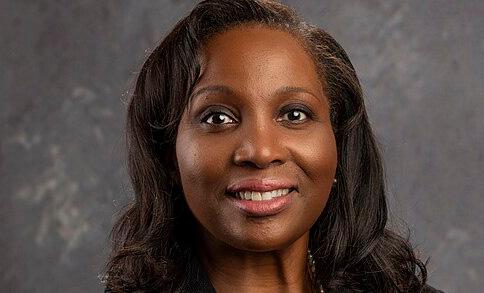
OPINION:
By Emil Guillermo
Don’t know Lisa Cook?
You better get to know her.
Because she could be you.
Cook is a high achieving African American woman who grew up in Georgia, and attended Spelman College, the HBCU powerhouse, as an undergrad. She went on to Oxford in England as a Marshall Scholar. Then finished up her PhD in economics at UC Berkeley.
As an economist at Michigan State University, she distinguished herself, then began working in the Obama administration in 2008.
Cook was highly touted and selected by Pres. Joe Biden to be a Federal Reserve governor in 2022. The deadlocked partisan vote in the Senate had to be broken by Vice President Kamala Harris.
Cook’s journey is familiar to most people of color used to facing resistance when they are so bright they come off as threatening. Their achievements and self-images don’t align with conventional stereotypes.
Now Donald Trump is trying to do to her what no president of the United States has ever done to a Federal Reserve Board governor.
Trump fired Cook this week for getting in the way of his vision of America’s economy. But what is his vision? He wants lower interest rates sure, but economists say lowering them prematurely could backfire and make the U.S. into another Turkey. In that country, the people voted for a “strongman” like Trump, who politicized the equivalent of the Fed in Turkey. That powerplay resulted in inflation soaring to as high as 86%.
Inflation has settled down to around 30% in Turkey, but you can see what a little politics in the wrong places can do to a country’s economy.
At the moment in the U.S., inflation is about 3%. And that’s a relative term. The price of vegan cheese for me is up about 40% at my grocery store.
That’s why Trump’s move to get rid of Cook is dangerous and

could backfire.
But for Trump it’s natural to disrespect Cook and the independence of the Fed, by meddling where he shouldn’t.
Cook is an independent thinker, an accomplished woman.
You have to be if you’re the first ever Black woman in history to serve on the Federal Reserve Board as a governor.
Trump has brazenly crossed the line that keeps the executive branch independent from the Federal Reserve.
The reason? One of Trump’s cronies on social media has accused Cook of lying on a personal mortgage act. That’s it. Official charges? Who needs them? Investigation into a suspected illegal act? Nope. A Trump friend off the top of his head accused Cook of something and it’s all the pretext Trump needs to remove her. Cook is filing a lawsuit.
Trump doesn’t like that the Fed Chair Jerome Powell refuses to lower interest rates. Trump has threatened Powell, but he hasn’t budged. What’s an historically racist White person like Trump to do? He went after the Central Park 5 half-cocked, so by the actions of his past, of course, Lisa Cook must go.
In reality, Cook is hardly a partisan, just doing what is best for the economy for all, exactly the way the Fed was intended to work, independent and free of politics.
Trump is hell bent on violating that. He shouldn’t be able to get away with it. Sadly, these days he gets away with everything.
About the Author Emil Guillermo is a veteran journalist, commentator, and humorist stage monologist. See him on YouTube.com@emilamok1 See him live at the Vancouver Fringe starting Sept. 4. Tickets here: https://www.vancouverfringe.com/events/emilamok-69-in-vancouver/
1111 Broadway, Suite 800, Oakland, CA 94607 (510) 208-7400 • www.alamedactc.org
Request for Qualifications (RFQ) for Oversight Construction Management and Project Support Services (RFQ No. R26-0004)
The Alameda County Transportation Commission (Alameda CTC) is seeking Statements of Qualifications (SOQ) for contracts to commence services in April 2026, or as indicated in the RFQ and/or appropriate addenda.
Key Dates:
• Optional Online Pre-Proposal Meeting is scheduled for Wednesday, September 10, 2025, at 2:00 p.m. Pacific Time (PT)
• SOQ due date: Thursday, October 2, 2025, BEFORE 3:00 p.m. PT
SOQs are subject to Alameda CTC’s Local Business Contract Equity Program. The Program goals for professional services are 70% for Local Business Enterprise (LBE) and 30% for Small LBE. For Program requirements and forms, visit Alameda CTC’s website. Any contract resulting from this RFQ will be awarded without discrimination based on race, color, religion, sex, sexual orientation or national origin. All RFQ documents are available Procurement Portal at https://alamedactc. bonfirehub.com. All questions regarding this RFQ must be submitted via the Procurement Portal, no later than 3:00 p.m. PT on September 16, 2025. Submittals must be made in accordance with the instructions in the RFQ. Any contract awarded must be in compliance with the local, state, and/or federal requirements.
Black Caucus Members ...
Continued from page 2
Prop 50 on the ballot to protect California.
“This is about citizens who are terrorized. With those being bullied, in need of someone to stand up, California is not going to sit down and be a bystander,” Ransom said. “The rules have been changed, and we have to act accordingly.”
All three Black members of California’s delegation to the U.S. House of Representatives — Congresswomen Sydney Kamlager-Dove (D-CA-37), Lateefah Simon (D-CA-12), and Maxine Waters (D-CA-43) are not likely to be affected by the proposed
redrawn Congressional maps.
In Sacramento, the 12-member CLBC was deeply involved in promoting redistricting efforts leading up to the final votes. They stood alongside their legislative colleagues voicing their support during legislative hearings and news conferences held around the state last week.
The CLBC also declared in a letter that it stands in full solidarity with the redistricting effort after Newsom signed the bill last week.
“This is not simply about politics. It is about justice, fairness, and ensuring that the voices of Black Americans are not erased from the halls of power,” CLBC stated. “The California Legislative Black Caucus will continue to

fight to protect the vote, defend the dignity of our communities, and uphold the promise of equality under the law.”
The debate in both houses of the State Legislature lasted about a total of six hours before the measures passed with a super majority vote by the Democrats. Republican lawmakers, in the upper and lower houses, fought against Democrats’ plans, emphasizing that electoral maps had already been drawn by the public.
“If the Trump administration and Texas leaders succeed in their plan, they will solidify their ability to govern without answering for the real-world consequences of their policies,” Weber Pierson stated.
1111 Broadway, Suite 800, Oakland, CA 94607 (510) 208-7400 • www.alamedactc.org
Request for Proposals (RFP) for Program Management and Project Controls Services (RFP No. R26-0003)
The Alameda County Transportation Commission (Alameda CTC) is seeking proposals for a contract to commence services on April 1, 2026, or as indicated in the RFP and/or appropriate addenda.
Key Dates:
• Optional Online Pre-Proposal Meeting is scheduled for September 2, 2025, at 10:00 a.m. Pacific Time (PT)
• Proposal due date: September 24, 2025 BEFORE 3:00 p.m. PT
Proposals are subject to Alameda CTC’s Local Business Contract Equity Program. The Program goals for professional services are 70% for Local Business Enterprise (LBE) and 30% for Small LBE. For Program requirements and forms, visit Alameda CTC’s website. Any contract resulting from this RFP will be awarded without discrimination based on race, color, religion, sex, sexual orientation or national origin. All RFP documents are available Procurement Portal at https://alamedactc. bonfirehub.com. All questions regarding this RFP must be submitted via the Procurement Portal, no later than 3:00 p.m. PT on September 8, 2025.
Submittals must be made in accordance with the instructions in the RFP. Any contract awarded must be in compliance with the local, state, and/or federal requirements.

Parker’s journey as a massage therapist began by working for other spas. She was inspired to rent a space, create her own business, and be able to really do the work she wanted while getting paid what she deserved.
A dancer and yoga practitioner who has more than 15 years’ experience, Parker makes a special effort to make sure that her services are accessible and helpful for Black women.
“It’s very important to take care of yourself in order to take care of other people because as Black women that’s what we do naturally,” Parker said. “Since ancient times we have been taking care of everyone and no one was really taking care of us. I want to be the person that helps us take care of ourselves.”
By Daisha Williams
Royal Touch Wellness, a massage and bodywork studio in Oakland, will be returning to the 10th Annual Black-Eyed Pea Festival on Sept. 13 at Marston Campbell Park at 17th and West in West Oakland.
Roshonda Parker, a Black therapist who wants to make wellness accessible for those who need it most, has skill in a variety of treatment methods, including chair massage, ear seeds as part of her acupuncture practice and ‘cupping.’
The wellness expert will be flying solo at the celebration of traditional African American music, food, and art, which will feature a day-long send up honoring the
sic, second-line band MJ’s Brass Boppers, the Oakland School for the Arts jazz band, and vocalist Piwai’s genre-bending send up of jazz and reggae influenced by her Zimbabwean traditions will grace the stage MC’d by Dance-A-Vision’s Carla Service, who will help keep you moving at the 10th Annual Oakland Black-Eyed Pea Festival (BEPF).
Food vendors with menus including the iconic black-eyed pea include Annabelle Goodridge, owner of Cocobreeze Caribbean Restaurant and Bakery; Chef Kathy Van Ness, of Ate o-Clock; Hal’s Hot Dogs and more.
Jewelers, painters, and T-shirt designers will sell their wares and there will be activities for children
To that end, she has created a 30-minute service exclusively for Black women as well as free massages at the Black Cultural Zone at Liberation Park on Saturdays at 6955 Foothill Blvd., and Wellness Wednesday at Frank Ogawa Plaza by Oakland City Hall at 15th and Broadway where regular services are offered on a sliding scale. More information about her different services can be found on her website, royaltouchwellness.com.
The 10th Annual Black-Eyed Pea Festival, a free celebration of traditional African American music, food, and art will be held on Sat. Sept. 13, from 11 a.m. to 6 p.m. at Marston Campbell Park, 17th and West streets in West Oakland. For more info, go to Oakbepf. com or call 510-332-5851. Bring a chair or blanket for the lawn or reserve a table for six for $150

Mayor Barbara Lee: First 100 Days ...
Continued from page 1
ambassadors as block captains in Oakland’s business corridors and building a seven-city regional partnership to prevent gun and gang violence.
“Public safety is strongest when our strategies are comprehensive, collaborative, and community centered. Under Mayor Lee’s leadership, we are deepening our work to create a safe and healthy Oakland and strengthening our partnerships with civic, business, and community leaders to reduce violence and expand prevention programs,” said Dr. Holly Joshi, chief of the city’s Department of Violence Prevention.
Since taking office, the mayor’s administration has secured millions of dollars for homelessness transformation and is currently hiring a leadership team for the Office of Homelessness Solutions and leveraged available resources for proven solutions.
Prioritizing community engagement, Lee has also involved over 1,500 residents in 15 sessions. She has based her priorities on the concerns the community has identified,
“The mayor is focusing on what matters to Oakland businesses, ensuring our streets are safe and clean, a transparent government and bringing jobs and economic opportunity to all corners of our City,” said Oakland Chamber of Commerce President and CEO Barbara Leslie.
Looking at next steps, Lee’s administration plans to expand the Mayor’s Summer Youth Employment Program to serve 500 participants in 2026, create Arts and Entertainment Districts to support Oakland businesses, and launch a campaign showcasing Oakland as a world-class destination city.
“This is just the beginning,” said Lee. “We’re building a foundation for long-term transformation that centers community voices, delivers measurable results, and creates the Oakland our residents deserve.”
The mayor’s leadership reflects her belief that Oakland thrives when residents’ voices are at the center of governance, and when government acts boldly, responsibly, and inclusively to deliver results, according to a statement from the mayor’s office.
This week’s report details progress on the mayor’s public safety priority: “(bringing) together Police Department leadership and representatives from all business corridors to coordinate and improve public safety strategies.”
So far, Lee has involved 10 business leaders in a safety coalition, funded five police academies, and authorized 678 officers toward a 700-officer goal; and funded an expansion of Oakland’s Community Safety Ambassador program.
Mayor Lee’s administration has also revived sideshow enforcement patrols; created employer partnerships for citywide safety; connected merchants with Business Improvement District advisors to activate a “Block Captain” model that involves police and community ambassadors; and developed security plans for hospitals in partnership with the Oakland Police Department.
Next steps include increasing downtown nighttime and weekend Police and Community Safety Ambassadors; training community ambassadors as block captains in Oakland’s business corridors; creating a seven-city regional partnership to prevent gun and gang violence; and developing a citywide task force on immigrant community support and protections.
The administration’s priority to increase homelessness resources focuses on “securing Oakland’s fair share of money from Alameda County to address (the city’s) homeless crisis.”
So far, the City has established an Office of Homelessness Solutions to prevent homelessness,
connect people to services, and help people find permanent housing; worked with the community and Board of Supervisors to ensure 80% of Alameda County’s Measure W funds are dedicated to reducing homelessness; and secured state Homeless Housing Assistance and Prevention funding for affordable housing projects.
The mayor’s economic development priority is bringing together CEOs of the “10 largest Oakland employers to discuss public-private initiatives that can improve Oakland’s economy and increase public safety.”
Accomplishments include involving Oakland’s largest employers; delivering a $3 million Business Incentive Program and funded Economic Activation Zones in partnership with the City Council.
The mayor’s administration has fast tracked 22 bright new streetlights around Fox Theatre, reinstated the Mayor’s Summer Youth Employment Program for more than 200 Oakland youth; employed 75 residents to remove 30 tons of trash; reinstated funding for a Cultural Affairs Division Manager in partnership with City Council; and boosted graffiti cleanup resources for business corridors in partnership with the City Council.
Next steps will be to create Arts and Entertainment Districts to support Oakland businesses; implementing comprehensive clean and safe streets with coordinated enforcement teams; uplifting business districts through streamlining permits, filling vacant storefronts, and cultural activations; and expanding Mayor’s Summer Youth Employment Program to serve 500 participants in 2026.
Reducing fire risk, the City is prioritizing the use of vegetation management crews to clear the city’s high fire danger zones.
Already the Oakland Fire Department has cleared brush from over 1,300 high-risk acres; partnered with the City Council to invest $10.3 million to keep all fire stations open; and secured a $1.5 million CAL FIRE grant and expanded coverage to East Oakland hills.
On the priority for “Good Government (and) Charter Modernization,” the mayor has appointed a “task force of League of Women Voters, ethics, and good government experts to modernize Oakland’s Charter and strengthen government accountability.”
The taskforce is scheduled to present Charter reform recommendations by January 2026, ahead of an anticipated November 2026 ballot measure.
Dealing with the priority on trash and illegal dumping, the City already has staffed up trash reduction crews and partnered with the Alameda County District Attorney’s Office to prosecute illegal dumping.
So far, the City has removed 30 tons of waste around schools; cleared trash from 30 miles of Oakland streets; added over $1 million illegal dumping enforcement technology and officers; partnered with the District Attorney’s Office and OPD to develop an illegal dumping strategy; and secured agreement for Caltrans to reimburse the City for off-ramps cleanup.
Lee has also achieved significant results on her other priorities, including increasing public participation in governance, eliminating roadblocks for small businesses; generating public-private partnerships; stabilizing the budget; and auditing city contracts to ensure that funding to contractors and nonprofits is well spent.
For the full 100-day report with complete details on all initiatives and upcoming projects, visit https://blog.oaklandca.gov/ the-pulse-of-the-town/100-daysof-action.
Oakland Receives $1.7M State Grant ...
Continued from page 1
ward with these solutions until every resident has housing.”
The Maya is an existing motel that will be purchased and converted into studio apartments. All units will consist of kitchenettes, cooktops, refrigerators, private bathrooms, and bed furnishings. Additionally, free internet service will be available in all units, and free laundry services are provided for all residents.
The project is located among other city services including AC Transit bus transportation, MacArthur BART station, farmer’s markets, retail establishments, and medical services.
This grant marks Oakland’s 10th successful Homekey application, building on the City’s focus on creating housing for formerly homeless individuals. The award leverages nearly $8.7 million in City of Oakland funds through the Rapid Response Homeless Housing (R2H2) program as well as $1.8 million from Alameda County’s Department of Behavioral Health.
As with other of Oakland’s Homekey projects, there will be a multi-pronged approach designed to ensure the project is successful. Danco Communities will develop and own the property, and Operation Dignity will serve as the property manager and service provider.
Operation Dignity will connect residents to community resources for substance abuse services, peer support activities, physical and mental health services, and education and employment services.
Homekey+, administered by California Housing & Community Development, is a state program that began at the start of the COVID-19 pandemic to facilitate the purchase and/or rehabilitation of hotels, motels, vacant apartment buildings, manufactured homes, and other properties, and convert them into homes for people experiencing or at risk of homelessness.
With this latest award, Oakland has secured more than $105.5 million in State Homekey funds since 2020 to house residents experiencing homelessness. The City’s ten awarded Homekey projects provide a total of 490 deeply affordable units for the unhoused.
Oakland’s other Homekey projects include:
Clifton Hall, a former dormitory with 61 units for seniors and families;
• Inn by the Coliseum, a repurposed motel with 36 units;
• Project Reclamation, a series of scattered single-family homes throughout Oakland for 80 families and individuals;
• Inn at Temescal, a repurposed motel with 21 units for veterans experiencing homelessness;
• Piedmont Place, a repurposed motel with 44 units;
• Kingdom Builders Transitional Housing, a repurposed motel with 34 transitional units for homeless youth and formerly incarcerated residents;
• Imperial Inn, a repurposed motel that will have over 47 permanent supportive housing units;
• CSH Enterprise/Quality Inn, a repurposed motel offering 104 units including 26 for transitional-aged youth; and
• Dignity Village, 40 modular units for seniors experiencing homelessness, to be built on publicly owned land.
Praising the project, District 1 Councilmember Zac Unger said, “High-quality permanent supportive housing, with effective wrap-around services, is exactly what we need to effectively and compassionately address homelessness.”
Oakland Housing and Community Development Director Emily Weinstein said, “Increasing the supply of deeply affordable housing is critical to our efforts to address the homelessness crisis.”
Investments in “homelessness prevention and permanent housing, together with interim shelter, will strengthen … our city’s overall homelessness response system,” she added.
“We are incredibly pleased to be in a position to collaborate with the City of Oakland on this important housing resource for the community,” said Alameda County Behavioral Health Department Director Dr. Karen Tribble. “We share the City of Oakland’s commitment to providing life-changing resources to those who are in greatest need and know that many individuals are who are experiencing severe mental illness will be supported through this project.”
PUBLIC NOTICE
NOTICE OF PUBLIC HEARING, PUBLICATION, & REQUEST FOR PUBLIC COMMENTS ON THE CITY OF OAKLAND’S CONSOLIDATED ANNUAL PERFORMANCE AND EVALUATION REPORT (CAPER) FOR FISCAL YEAR 2024-2025
The CAPER provides an annual assessment of the City’s progress in carrying out its strategic plan and reports its use of federal funds to meet community development and housing needs.
Members of the public are invited to attend and give public comment at a public hearing during the September 15, 2025, special meeting of the City Council for this informational report, and to review the draft CAPER to provide written input/feedback between September 1, 2025, and September 15, 2025. Please see detailed public hearing and review period information below. This report covers activities funded through the following U.S. Department of Housing and Urban Development (HUD) programs:
• Community Development Block Grant (CDBG)
• HOME Investment Partnerships (HOME)
• Housing Opportunities for Persons With AIDS (HOPWA)
• Emergency Solutions Grants (ESG)
A public hearing for the CAPER will be held in-person
‘Remember Them’ Monument ...
Continued from page 1
Civil Rights. The display surrounded by condominiums and across the street from the Oakland School of the Arts (OSA), is more than a monument, it’s a living classroom, inviting reflection on humanity’s struggles, achievements, and ideals.
What sets the “Remember Them” monument apart is its inclusive vision. Chiodo’s design honors humanitarians whose courage transcends borders, faiths, and backgrounds. It acknowledges towering icons like Dr. Martin Luther King Jr., Nelson Mandela, and Mahatma Gandhi, while equally elevating often overlooked figures such as Ruby Bridges, who at age 6 braved racial hostility to integrate a Louisiana school.
The monument creates a dialogue across time and geography. From Oskar Schindler reminding viewers of the moral courage that arose during World War II to religious and spiritual leaders, including Mother Teresa, and Coretta Scott King, who used their power of compassion and peace in advancing justice. Literary and cultural contributors like Maya Angelou and Elie Wiesel reveal how words and testimony can transform societies.
By blending these diverse voices, the monument emphasizes that the struggle for justice is not confined to one movement, community, or era. But the struggle to maintain the symbolic creation is unacceptable to one neighboring resident.
According to native Oaklander Charise Carter, who lives three blocks away, the monument has been neglected for over a year, caked in bird droppings.
at City Council Chamber, Third Floor & virtually via KTOP and Zoom, on Monday, September 15, 2025, during the 9:30 am special meeting of the City Council. For public comment and viewing instructions go to: https://oakland.legistar.com/ Calendar.aspx, select the “Agenda” icon for the special City Council meeting on September 15, 2025. Accessibility: Translation services and assistance for persons with disabilities is available upon advance request. See details on the City Council Agenda. The draft CAPER will be available for public review between September 1, 2025 – September 15, 2025 at: https://www.oaklandca.gov/ files/assets/city/v/1/housing-comm-dev/documents/ caper/2024-25-consolidated-annual-performanceand-evaluation-report.pdf
Written input/feedback will also be accepted prior to the public hearing and may be submitted via email to: CDE@oaklandca.gov with the subject line: “CAPER Comments”
“This is an amazing space, a place to be proud of,” she said. “I have a family reunion here in Oakland on Sept. 6. My family members are flying in from as far away as Washington, D.C. What a disappointment not to be able to showcase a monument to our heritage right in my own neighborhood.”
From Malcolm X’s fiery advocacy for Black empowerment to Susan B. Anthony’s tireless fight for women’s suffrage, each figure of the “Remember Them” monument embodies a piece of humanity’s broader pursuit of equality and freedom. But covered in bird poop, the monument’s message is ruined.
The “Remember Them” monument is a gathering place for reflection, education, and civic pride. School groups, community members, and visitors from around the world come to honor the sacrifices and achievements of these extraordinary individuals. On a Monday afternoon the only visitor was a homeless woman exhibiting mental health issues among the statues and bird feces.
Carter says monument’s the designer, Mario Chiodo told her that a large sum of money was provided for the upkeep of the monument when it was initially dedicated. “He is very disappointed. He says dry washing may not help and the monument may need resurfacing.”
“I don’t understand why a monument of this stature and significance is not kept up,” said Carter. Carter says she contacted the mayor’s office last week to bring it to their attention and the representative was unaware of the problem. She did get a response from Councilmember Zac Unger’s office who offered to check into the matter. She says her prior complaints have been ignored.
Oakland Landlords ...
Continued from page 1
units could be exempt if they are not listed as being owned by a real estate investment trust or a corporation.
State law requires all California landlords to give their tenants at least 30 days’ notice in writing if they are increasing their rent 10% or less, and at least 90 days’ notice if they are increasing their rent more than 10%. For rent-controlled units in Oakland, landlords can’t increase rent more than once a year.
In some cases, landlords leasing rent-controlled units can raise the rent more than the maximum allowable increase. If the landlord does increase beyond the maximum, they have to inform their tenant in writing.
The most common way an Oakland tenant living in a rentcontrolled building can be charged more than the .8% limit is banking.
Banking is a process where a landlord who didn’t increase a tenant’s rent to the maximum allowable amount in any of the previous five years can bank that increase. Essentially, they can calculate how much a tenant’s rent would be if they had charged the maximum allowable increase during those
years, and apply that increase to the current year.
There are a few other ways an Oakland landlord can increase the rent higher than the annual allowable limit. These include capital improvement, increased housing service costs, uninsured repair costs, and fair return.
For units covered under its rent control ordinance, Oakland requires landlords to include notice of the ordinance and information about the city’s rent board. If a tenant thinks their rent increase is in violation of the law, Ethan Silverstein, an Oakland-based tenant lawyer who works with Movement Legal, suggests contacting the rent board for assistance.
Oakland’s rent board is available by phone at 510-238-3721 Monday through Thursday from 9:30 a.m. to 4:30 p.m., and by email at RAP@ oaklandca.gov.
Silverstein also suggests linking with tenant unions and advocacy groups, like Bay Area Tenant and Neighborhood Councils (Bay Area TANC), Oakland Tenants Union, and The Alliance of Californians for Community Empowerment (ACCE) Action.
Regional Center of the East Bay ...
Continued from page 1
supported for the work we do.”
At a RCEB-PVAC meeting held in 2023, a Latino parent testified, “We can’t understand our child’s Individual Program Plan (IPP). The interpreter isn’t there, or the documents aren’t translated. How can we participate?” (IPP is the report prepared by RCEB describing for the consumer/family the services it plans to provide.)
At a 2024 RCEB-PVAC meeting an Asian family complained saying, “My son’s profile (IPP) wasn’t complete for months. By the time we got a referral, we had already lost critical support.”
The persistence of these disparities, despite the RCEB’s repeated acknowledgments, has triggered erosion of community trust, legal exposure under Title VI and §1983, and risks of federal oversight or state corrective action. Advocates argue that without immediate, transparent reforms including independent monitoring, public reporting, and culturally competent service expansion, RCEB will continue to repeat the cycle of making promises without fulfillment.
The impartial record shows that
RCEB’s leadership is fully aware of these systemic inequities, but their administrative follow-through is severely lagging because the public, providers and families across African American, Latino, and Asian communities have continued to file complaints that echo one another for many years.
The question is no longer whether racial disparities exist. Disparities and inequitable treatment have been documented and RCEB has received a comprehensive report of the conditions.
The pressing question now is whether the RCEB Executive Board, under the DDS’ oversight, is going to release the study that it commissioned and invite Dr. Eleanor Mason Ramsey to present the study findings.
The Mason Tillman Associates Report can convert RCEB’s promises into definitive manageable and measurable action plan and the implementation of the action items could be monitored and measured. Angeleter Pringle is president and CEO of All People of Color Developmental Disability Association, Inc. Her email address is apocdda@ gmail.com.